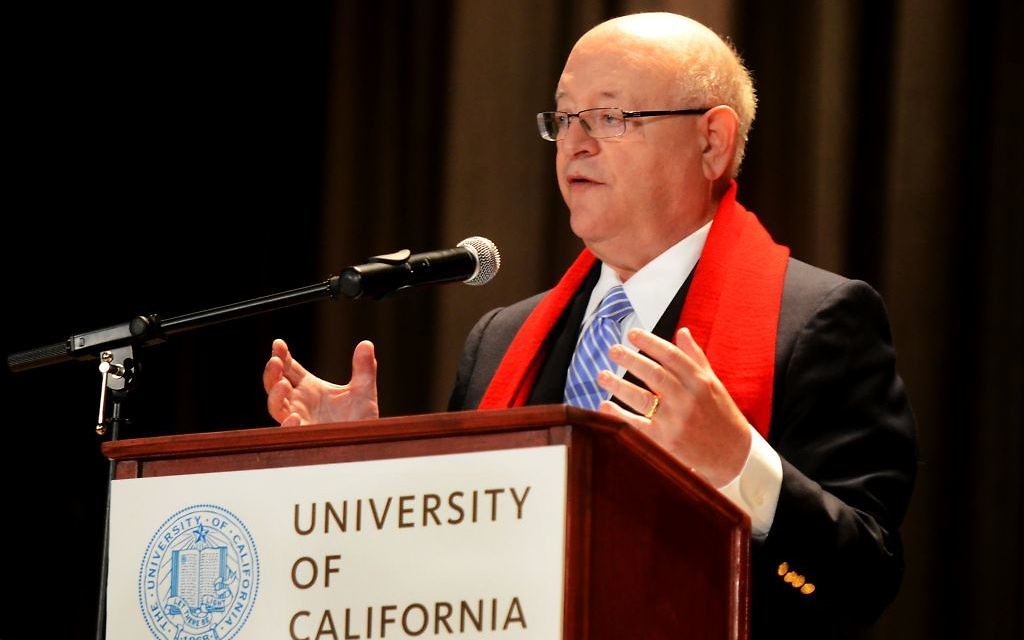4 Questions With Mark Yudof
Get to know the emeritus law professor at UC Berkeley before his speech on 'free speech' on campuses Jan. 16.
Mark Yudof had a front-row seat for the rise of the boycott, divestment and sanctions movement on American college campuses as the president of the University of California from 2008 to 2013. Now as an emeritus law professor at UC Berkeley and the chair of the Academic Engagement Network’s advisory board, the constitutional law expert speaks nationally on issues of BDS, free speech and academic freedom.
In advance of a lecture in Buckhead on Tuesday, Jan. 16, about those issues, Yudof answered AJT’s 4 Questions.
AJT: What led you to pursue a career in education and law?
Get The AJT Newsletter by email and never miss our top stories Free Sign Up
Yudof: I spent two years at the Harvard Center for Law and Education and gained a great interest in elementary and secondary education. I was fascinated by the intersection of educational policy and law, particularly as they impacted low-income and minority students. I co-authored an early casebook on educational policy and the law. I wrote a book entitled “When Government Speaks.”
Later, as an administrator and constitutional law teacher, my focus evolved to higher education. Later still, I became concerned about the BDS movement, anti-Israel sentiment, anti-Semitism and the implementation of the First Amendment at universities. These concerns led to the establishment of the Academic Engagement Network, where I serve as chair of the advisory board.
AJT: What was the most hostile experience you’ve encountered on campus?
Yudof: There were many such occasions. In many cases, meetings of the UC board of regents, on which I served as UC president, were disrupted, and protesters eventually were removed to allow the board to conduct its business. In addressing a student meeting at UC Riverside (by live video), I was interrupted and vehemently criticized because my spouse served on the Hillel International board. Protesters frequently tried to shut down my public speeches, sometimes successfully. Twice, regents and I were unable to leave the venue we were using until police intervened. On one University of Minnesota campus, a protester distributed anti-Semitic literature during one of my visits.
AJT: What are some university resolutions or achievements which have led to greater protection of free speech and increased opposition to BDS rhetoric at the University of California campuses?
Yudof: The list of positive Academic Engagement Network interventions, in collaboration with Hillel and other Jewish organizations, against BDS and for freedom of expression are many. AEN faculty worked successfully with others to defeat BDS initiatives at Illinois, Ohio State and elsewhere. Where student governments or student plebiscites favoring BDS prevailed, we worked with presidents and chancellors and helped secure statements that indicated that BDS would not be university policy. We successfully urged the UC board of regents to adopt a statement on intolerance that specifically addressed anti-Semitism on UC campuses. Ken Waltzer and I co-authored an impactful Wall Street Journal article on anti-Semitism and BDS at Vassar.
AJT: What is your perception of millennials’ level of knowledge about Israel and hate crimes today?
Yudof: According to surveys and a study by Gillman and Chemerinsky, many students embrace the notion that there is a hate-speech exception to the First Amendment. This is completely contradicted by the applicable constitutional cases. More education about democratic values and the Bill of Rights is needed.
Who: Mark Yudof
What: “Freedom of Speech and Campus Disruption,” presented by the Academic Engagement Network and the Schusterman Center for Israel Studies
Where: Grand Hyatt Atlanta, 3300 Peachtree Road, Buckhead
When: 7:30 p.m. Tuesday, Jan. 16
Admission: Free; RSVP to linda@academicengagement.org or 202-774-5824





comments